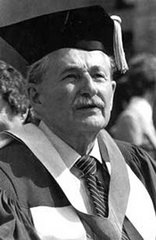No to 'Educare'!
Today's Winnipeg Free Press Editorial hit the nail right on the head: Canadians have the right to universal healthcare, but "educare" is not a fundamental pillar of our society. Education costs money -- money that the provincial public sector simply doesn't have. What's worse, quality education costs even more. Just ask students at the University of Manitoba, who have seen first-hand the impact of a decade-long tuition freeze -- larger class sizes, overloaded professors, crumbling infrastructure... That engineering students at the UofM are pushing for an end to tuition freezes should say something to all of us -- there is more than one side to the tuition debate. There is more than one side to the student body. These folks are not South Winnipeg elitists, either. They care about accessibility, but feel that it shouldn't come at the cost of quality. Like their counterparts in the UofM Law faculty in 2003, the Engineering students' plan includes using a portion of the fee hikes to fund bursaries for less-fortunate students. A red tory solution to rising tuition costs if I ever heard of one. Far better than blind, socialist tuition freezes.





1 comment:
WFP Editorial - No to 'educare'
Manitoba's largest university is so stretched for cash that teaching staff in some classes can mark only one of five questions on assignments; that the engineering faculty's national accreditation could be jeopardized due to the lack of resources. It sounds apocryphal -- but it's not. Engineering students, who live with those realities of government-imposed tuition freezes, are proposing a 40-per-cent increase to their tuitions to stem the decline in the quality of their education.
It is not the first time students have wrestled with the funding dilemma brought on by the Doer government's seven-year freeze on tuitions. In 2003, law students adopted a similar proposal, building into the levy a fund for bursaries and scholarships. Such programs can assist students of lower incomes needing help. And Manitoba university students face the highest ancillary fees in the country because the schools have increased them dramatically to feed operating budgets they claim are being starved of necessary funds. As one student leader said, such hikes mock the province's claim its policy of tuition freeze and rebates to students has kept higher education widely accessible in this province.
That student activist was not suggesting that tuition freezes or rebates stop, though. In fact, last week, some students were marching to demand further cuts to their tuitions -- now among the cheapest in Canada. Blind to the practical impact of cut-rate tuitions on the quality of education, tomorrow's leaders want dramatic increases to government post-secondary grants.
It seems an article of faith for student unionists that a post-secondary education is a Canadian birthright, not unlike the way universal medicare is regarded. Any taxpayer can attest, however, that such universal programs do not come cheaply: Health care eats more than 40 per cent of provincial budgets and its appetite is only growing.
Canada can ill-afford educare. More thoughtful students recognize a degree, much like apprenticeships, trade school or college diplomas, is an investment that requires a measure of risk and personal debt. Not every high-school graduate wants to or should go on to post-secondary education. Many find their own way. U of M law students chose to protect the quality of their education and provide for deserving students who need financial assistance. The Doer government's tuition freeze, a powerful political gambit, merely short-changes the value of a Manitoba degree.
Post a Comment